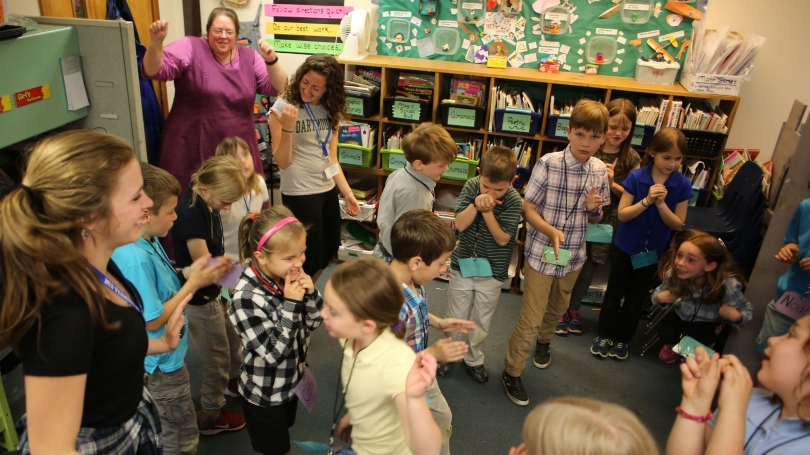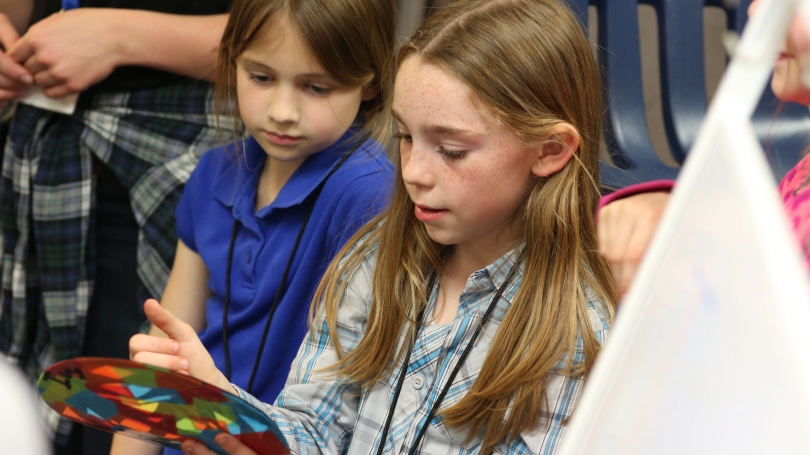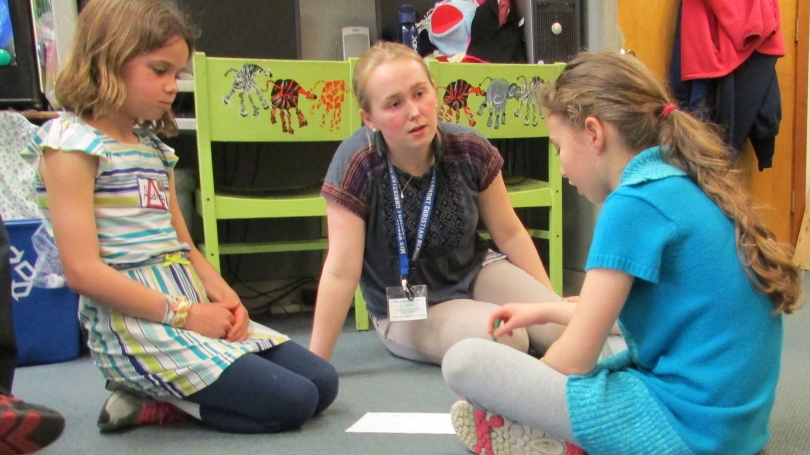START: A Collaborative Creative Experience
START (Students Teaching in the Arts) is a Hop program in which Dartmouth students are given the opportunity to interact with local 1st to 8th grade classrooms as arts instructors. Explaining START in greater detail is always challenging because while we focus on teaching and art, we also do neither.
START isn’t about teaching the students new material, and it doesn’t try to provide arts instruction either. Rather, our lessons aim for arts integration, helping students reimagine what they learn in the classroom in innovative, creative ways. Our volunteers get students out of their routines and use music, dance, theater and visual art to show them other ways to learn, other types of intelligence, and other applications for their course material. Through START, we try to highlight skills that are not usually activated in the classroom. We hope that through the program, students will appreciate art not just as art but as a way to process information and to problem-solve. START disrupts the idea that art and academics are separate fields and offers ways for anyone to use art in their learning.
Not just the young students but also the volunteers learn skills that have value beyond the classroom. As a START volunteer, I’ve had to adapt to different classroom dynamics, change lesson plans on the spot, and bounce back after an activity nose-dives. START gives you the confidence to be flexible, the ability to think on your feet, and the courage to act ridiculous in front of a group of people—whether you have to sing a parody song about the Bill of Rights or move like a cheetah in slow-motion. And the kids are much more likely to take risks if they see you try as well.
While START enables volunteers to develop and implement their own lesson plans, we try to emphasize that the goal of START is not the flawless execution of a lesson. Part of teaching is learning when it isn’t worth it to force an activity that just isn’t working for some students; our mission is to provide an alternative to traditional education, giving students an outlet through art. I taught a 6th-grade student who refused to participate for weeks, and the other volunteers and I figured she thought she was too cool for the activities. She’d stand in the back or discourage the other students, and we gave her the option of sitting a few projects out until I was able to talk to her about why she didn’t want to do anything. She admitted she didn’t think she could the projects well enough in the time we were giving them—she didn’t want to start something she wouldn’t be happy with. We ended up letting her spend the entire class on only one element of the project, and she actually became so focused, didn’t talk to anyone, and produced a high-quality, detailed project that absolutely floored us. We hadn’t seen her show any interest in art in weeks, but it turned out she was actually incredibly skilled and only wanted to participate if she could get it to that level. By keeping our lesson plans flexible, we give students the freedom to engage with the activities to the level they need; school is hard and exhausting and sometimes they need to just be left alone to draw for half an hour if they’re acting out rather than persuaded to do exactly what we planned.
While our volunteers are almost entirely self-directed during the term, START works to sustain lasting relationships between the teachers, schools and Dartmouth. When I return to schools, I’ll pass former students in the hall who recognize me; when their teacher announces START is coming, a classroom that’s never had us before will know START nonetheless because of those students’ siblings’ or friends’ involvements.
We also try to collaborate with the Hop and others across the Dartmouth campus. This fall, a 5th grade classroom learning about African drumming attended the school matinee performance by Mamadou Diabate and Percussion Mania at the Hop, and one of our START volunteers met them and take them on a tour! Many of our partner schools are very small and rural, often with high poverty rates, and START offers a chance for students to interact with people in college and learn about ways to further their education. One of our partner teachers, Miss Blessing, usually asks volunteers to give a short bio about what they’re studying at Dartmouth and how art relates to their work, whether a volunteer is a music major or visualizes statistical data in QSS or, in my case, makes maps through GIS for Geography. She shares this information with the students before we even enter the classroom, showing them that, even if they don’t intend to pursue art as a career, creativity has a place in higher education, encouraging them to stay excited about learning. Volunteers also show off their skills from Dartmouth, whether bringing in the instrument they play in the DSO or rap-battling a student while explaining D-Style.
This spring, we were able to bring Miss Blessing’s 2nd/3rd graders to Howe Library for our final visit, and they decorated the courtyard with chalk art. Our topic for the term was geometry, so we turned the chalk drawings into a symmetry challenge: students partner up and each draw something, then they have to replicate their partner’s drawing across a line of symmetry. The kids absolutely loved it and took it well beyond our expectations, covering the entrance to the library. Miss Blessing was able to turn our hour visit into a full-day field trip to Dartmouth, using START as a jumping-off point for further engagement in Hanover, and Hanover was able to learn more about START!


